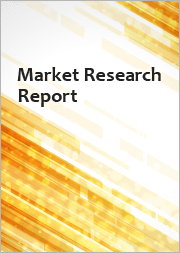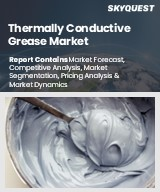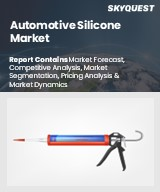
|
시장보고서
상품코드
1722612
그리스 시장 보고서 : 증점제 유형, 기유, 최종사용자, 지역별(2025-2033년)Grease Market Report by Thickener Type, Base Oil, End User, and Region 2025-2033 |
||||||
IMARC Group은 2024년 세계 그리스 시장 규모가 39억 달러에 달했으며, 2025년부터 2033년까지 2.8%의 연평균 성장률(CAGR)로 2033년에는 50억 달러에 달할 것으로 예측했습니다. 시장을 이끄는 몇 가지 요인은 고품질 제품 출시에 대한 관심 증가, 급속한 도시화로 인한 이륜차, 삼륜차, 사륜차 생산량 증가, 성능 향상을 위한 첨단 기술 통합 등 여러 가지가 있습니다.
그리스는 선박, 기계, 차량 및 그 구성품을 부식, 마모, 손상으로부터 보호하기 위해 사용되는 반고체 윤활제입니다. 성능을 향상시키는 첨가제, 윤활유, 증점제를 포함합니다. 그리스는 동물 폐기물의 지방, 식용이 불가능한 라드, 합성유를 사용하여 제조되며, 증점제를 포함한 석유 유래 제품도 있습니다. 그리스는 누수를 최소화하고 오염 물질로부터 보호하는 실란트 역할을 합니다. 유연성 유지, 베어링 표면 보호, 스톱-스타트 성능 향상, 마찰 감소에 도움을 줍니다. 높은 열 안정성과 내마모성, 방청 성능 향상, 높은 점도 지수, 부식 방지 효과를 발휘합니다. 그 결과, 그리스는 자동차, 화학 제조, 발전, 야금, 식품 및 음료 등 다양한 산업에서 광범위하게 사용되고 있습니다.
그리스 시장 동향:
세계 자동차 산업의 괄목할만한 성장으로 시장 전망은 매우 밝습니다. 그리스는 볼 조인트, 타이로드 엔드, 서스펜션, 섀시, 컨트롤 암 샤프트, U 조인트의 윤활에 널리 사용됩니다. 이에 따라 고성능 자동차에 대한 수요가 증가하고 있는 것도 시장 성장을 촉진하고 있습니다. 또한, 그리스는 안정성과 내열성 특성으로 인해 스위치, 커넥터, 휠 베어링, 기어 등 다양한 자동차 부품을 마모 및 손상으로부터 보호합니다. 또한, 재생 가능하고 황 함량이 낮은 무해한 재료를 사용하여 제조된 바이오 기반 친환경 그리스의 개발 등 다양한 제품 혁신이 시장 성장을 크게 촉진하고 있습니다. 또한, 풍력발전소에서는 잔류물을 제거하고 더 깨끗한 작동을 보장하기 위해 고성능 그리스가 널리 채택되어 시장 성장에 긍정적인 영향을 미치고 있습니다. 이와는 별도로, 바이오 기반 그리스의 사용을 장려하는 다양한 정부 이니셔티브의 시행과 제조 분야에서 제품 수요의 증가는 시장 성장을 촉진할 것으로 예상됩니다.
본 보고서에서 다루는 주요 질문
- 그리스 세계 시장 규모는?
- 2025-2033년 그리스 세계 시장 성장률 전망은?
- 세계 그리스 시장을 주도하는 주요 요인은 무엇인가?
- COVID-19가 세계 그리스 시장에 미치는 영향은?
- 세계 시장에서 그리스 증점제 유형별 분류는?
- 세계 시장에서 그리스의 기유별 분류는 어떻게 되는가?
- 세계 시장에서 그리스의 최종사용자별 분류는 어떻게 되는가?
- 세계 시장에서 그리스의 주요 지역은?
- 세계 그리스 시장의 주요 플레이어/기업은?
목차
제1장 서문
제2장 조사 범위와 조사 방법
- 조사 목적
- 이해관계자
- 데이터 소스
- 1차 정보
- 2차 정보
- 시장 추정
- 상향식 접근
- 하향식 접근
- 조사 방법
제3장 주요 요약
제4장 소개
- 개요
- 주요 업계 동향
제5장 세계의 그리스 시장
- 시장 개요
- 시장 실적
- COVID-19의 영향
- 시장 예측
제6장 시장 내역 : 증점제 유형별
- 금속 비누 증점제
- 비비누 증점제
- 무기 증점제
- 기타
제7장 시장 내역 : 베이스오일별
- 광유
- 합성유
- 바이오 기반 오일
제8장 시장 내역 : 최종사용자별
- 자동차
- 건설 및 오프로드
- 일반 제조업
- 강철
- 광업
- 기타
제9장 시장 내역 : 지역별
- 북미
- 미국
- 캐나다
- 아시아태평양
- 중국
- 일본
- 인도
- 한국
- 호주
- 인도네시아
- 기타
- 유럽
- 독일
- 프랑스
- 영국
- 이탈리아
- 스페인
- 러시아
- 기타
- 라틴아메리카
- 브라질
- 멕시코
- 기타
- 중동 및 아프리카
- 시장 내역 : 국가별
제10장 SWOT 분석
- 개요
- 강점
- 약점
- 기회
- 위협
제11장 밸류체인 분석
제12장 Porter's Five Forces 분석
- 개요
- 구매자의 교섭력
- 공급 기업의 교섭력
- 경쟁 정도
- 신규 참여업체의 위협
- 대체품의 위협
제13장 가격 분석
제14장 경쟁 구도
- 시장 구조
- 주요 기업
- 주요 기업 개요
- AXEL Christiernsson AB
- Carl Bechem GmbH
- Chemtool Incorporated(Lubrizol Corporation)
- ENEOS Holdings Inc
- Exxon Mobil Corporation
- Fuchs Petrolub SE
- Gazpromneft-Lubricants Ltd.(Gazprom Neft PJSC)
- Harrison Manufacturing Company
- Kluber Lubrication(Freudenberg Chemical Specialities SE & Co. KG)
- LUKOIL
- Petromin Corporation(Al Dabbagh Group Holding Company Limited)
- Royal Dutch Shell PLC
The global grease market size reached USD 3.9 Billion in 2024. Looking forward, IMARC Group expects the market to reach USD 5.0 Billion by 2033, exhibiting a growth rate (CAGR) of 2.8% during 2025-2033. There are several factors that are driving the market, which include the rising focus on introducing high-quality products, increasing production of two-, three-, and four-wheelers due to rapid urbanization, and integration of advanced technologies for enhanced performance.
Grease is a semi-solid lubricant used for protecting vessels, machines, vehicles and their components from corrosion, wear and tear. It contains performance-enhancing additives, lubricating fluids and thickeners. It is manufactured using rendered fat of waste animal parts, inedible lard and synthetic oil, or can be petroleum-derived containing a thickening agent. Grease acts as a sealant to minimize leakage of water and protects from contaminants. It assists in maintaining flexibility, protecting bearing surfaces, enhancing stop-start performance and reducing friction. It provides high thermal stability and wear resistance, enhanced rust-proofing performance, high viscosity index and corrosion protection. As a result, grease finds extensive application across various industries, such as automotive, chemical manufacturing, power generation, metallurgy, food and beverage.
Grease Market Trends:
Significant growth in the automotive industry across the globe is creating a positive outlook for the market. Grease is widely used to lubricate ball joints, tie-rod ends, suspension, chassis, control arm-shafts and U-joints. In line with this, the increasing demand for high-performance vehicles is favoring the market growth. In addition, grease protects various auto parts, such as switches, connectors, wheel bearings and gears from wear and tear due to its stability and temperature tolerance properties. Moreover, various product innovations, such as the development of bio-based and environment-friendly grease manufactured using renewable, non-toxic materials with low sulfur levels, are providing a considerable boost to the market growth. Additionally, the widespread adoption of high-performance grease in wind power plants to remove residue and ensure cleaner operations is positively impacting the market growth. Apart from this, the implementation of various government initiatives to encourage the utilization of bio-based grease and the increasing product demand in the manufacturing sector are anticipated to drive the market toward growth.
Key Market Segmentation:
Breakup by Thickener Type:
- Metallic-Soap Thickener
- Non-Soap Thickener
- Inorganic Thickener
- Others
Breakup by Base Oil:
- Mineral Oil
- Synthetic Oil
- Bio-based Oil
Breakup by End User:
- Automotive
- Construction and Off-Highways
- General Manufacturing
- Steel
- Mining
- Others
Breakup by Region:
- North America
- United States
- Canada
- Asia-Pacific
- China
- Japan
- India
- South Korea
- Australia
- Indonesia
- Others
- Europe
- Germany
- France
- United Kingdom
- Italy
- Spain
- Russia
- Others
- Latin America
- Brazil
- Mexico
- Others
- Middle East and Africa
Competitive Landscape:
The competitive landscape of the industry has also been examined along with the profiles of the key players being AXEL Christiernsson AB, Carl Bechem GmbH, Chemtool Incorporated (Lubrizol Corporation), ENEOS Holdings Inc, Exxon Mobil Corporation, Fuchs Petrolub SE, Gazpromneft - Lubricants Ltd. (Gazprom Neft PJSC), Harrison Manufacturing Company, Kluber Lubrication (Freudenberg Chemical Specialities SE & Co. KG), LUKOIL, Petromin Corporation (Al Dabbagh Group Holding Company Limited) and Royal Dutch Shell PLC.
Key Questions Answered in This Report
- 1.How big is the global grease market?
- 2.What is the expected growth rate of the global grease market during 2025-2033?
- 3.What are the key factors driving the global grease market?
- 4.What has been the impact of COVID-19 on the global grease market?
- 5.What is the breakup of the global grease market based on the thickener type?
- 6.What is the breakup of the global grease market based on the base oil?
- 7.What is the breakup of the global grease market based on the end user?
- 8.What are the key regions in the global grease market?
- 9.Who are the key players/companies in the global grease market?
Table of Contents
1 Preface
2 Scope and Methodology
- 2.1 Objectives of the Study
- 2.2 Stakeholders
- 2.3 Data Sources
- 2.3.1 Primary Sources
- 2.3.2 Secondary Sources
- 2.4 Market Estimation
- 2.4.1 Bottom-Up Approach
- 2.4.2 Top-Down Approach
- 2.5 Forecasting Methodology
3 Executive Summary
4 Introduction
- 4.1 Overview
- 4.2 Key Industry Trends
5 Global Grease Market
- 5.1 Market Overview
- 5.2 Market Performance
- 5.3 Impact of COVID-19
- 5.4 Market Forecast
6 Market Breakup by Thickener Type
- 6.1 Metallic-Soap Thickener
- 6.1.1 Market Trends
- 6.1.2 Market Forecast
- 6.2 Non-Soap Thickener
- 6.2.1 Market Trends
- 6.2.2 Market Forecast
- 6.3 Inorganic Thickener
- 6.3.1 Market Trends
- 6.3.2 Market Forecast
- 6.4 Others
- 6.4.1 Market Trends
- 6.4.2 Market Forecast
7 Market Breakup by Base Oil
- 7.1 Mineral Oil
- 7.1.1 Market Trends
- 7.1.2 Market Forecast
- 7.2 Synthetic Oil
- 7.2.1 Market Trends
- 7.2.2 Market Forecast
- 7.3 Bio-based Oil
- 7.3.1 Market Trends
- 7.3.2 Market Forecast
8 Market Breakup by End User
- 8.1 Automotive
- 8.1.1 Market Trends
- 8.1.2 Market Forecast
- 8.2 Construction and Off-Highways
- 8.2.1 Market Trends
- 8.2.2 Market Forecast
- 8.3 General Manufacturing
- 8.3.1 Market Trends
- 8.3.2 Market Forecast
- 8.4 Steel
- 8.4.1 Market Trends
- 8.4.2 Market Forecast
- 8.5 Mining
- 8.5.1 Market Trends
- 8.5.2 Market Forecast
- 8.6 Others
- 8.6.1 Market Trends
- 8.6.2 Market Forecast
9 Market Breakup by Region
- 9.1 North America
- 9.1.1 United States
- 9.1.1.1 Market Trends
- 9.1.1.2 Market Forecast
- 9.1.2 Canada
- 9.1.2.1 Market Trends
- 9.1.2.2 Market Forecast
- 9.1.1 United States
- 9.2 Asia-Pacific
- 9.2.1 China
- 9.2.1.1 Market Trends
- 9.2.1.2 Market Forecast
- 9.2.2 Japan
- 9.2.2.1 Market Trends
- 9.2.2.2 Market Forecast
- 9.2.3 India
- 9.2.3.1 Market Trends
- 9.2.3.2 Market Forecast
- 9.2.4 South Korea
- 9.2.4.1 Market Trends
- 9.2.4.2 Market Forecast
- 9.2.5 Australia
- 9.2.5.1 Market Trends
- 9.2.5.2 Market Forecast
- 9.2.6 Indonesia
- 9.2.6.1 Market Trends
- 9.2.6.2 Market Forecast
- 9.2.7 Others
- 9.2.7.1 Market Trends
- 9.2.7.2 Market Forecast
- 9.2.1 China
- 9.3 Europe
- 9.3.1 Germany
- 9.3.1.1 Market Trends
- 9.3.1.2 Market Forecast
- 9.3.2 France
- 9.3.2.1 Market Trends
- 9.3.2.2 Market Forecast
- 9.3.3 United Kingdom
- 9.3.3.1 Market Trends
- 9.3.3.2 Market Forecast
- 9.3.4 Italy
- 9.3.4.1 Market Trends
- 9.3.4.2 Market Forecast
- 9.3.5 Spain
- 9.3.5.1 Market Trends
- 9.3.5.2 Market Forecast
- 9.3.6 Russia
- 9.3.6.1 Market Trends
- 9.3.6.2 Market Forecast
- 9.3.7 Others
- 9.3.7.1 Market Trends
- 9.3.7.2 Market Forecast
- 9.3.1 Germany
- 9.4 Latin America
- 9.4.1 Brazil
- 9.4.1.1 Market Trends
- 9.4.1.2 Market Forecast
- 9.4.2 Mexico
- 9.4.2.1 Market Trends
- 9.4.2.2 Market Forecast
- 9.4.3 Others
- 9.4.3.1 Market Trends
- 9.4.3.2 Market Forecast
- 9.4.1 Brazil
- 9.5 Middle East and Africa
- 9.5.1 Market Trends
- 9.5.2 Market Breakup by Country
- 9.5.3 Market Forecast
10 SWOT Analysis
- 10.1 Overview
- 10.2 Strengths
- 10.3 Weaknesses
- 10.4 Opportunities
- 10.5 Threats
11 Value Chain Analysis
12 Porters Five Forces Analysis
- 12.1 Overview
- 12.2 Bargaining Power of Buyers
- 12.3 Bargaining Power of Suppliers
- 12.4 Degree of Competition
- 12.5 Threat of New Entrants
- 12.6 Threat of Substitutes
13 Price Analysis
14 Competitive Landscape
- 14.1 Market Structure
- 14.2 Key Players
- 14.3 Profiles of Key Players
- 14.3.1 AXEL Christiernsson AB
- 14.3.1.1 Company Overview
- 14.3.1.2 Product Portfolio
- 14.3.2 Carl Bechem GmbH
- 14.3.2.1 Company Overview
- 14.3.2.2 Product Portfolio
- 14.3.3 Chemtool Incorporated (Lubrizol Corporation)
- 14.3.3.1 Company Overview
- 14.3.3.2 Product Portfolio
- 14.3.4 ENEOS Holdings Inc
- 14.3.4.1 Company Overview
- 14.3.4.2 Product Portfolio
- 14.3.4.3 Financials
- 14.3.5 Exxon Mobil Corporation
- 14.3.5.1 Company Overview
- 14.3.5.2 Product Portfolio
- 14.3.5.3 Financials
- 14.3.5.4 SWOT Analysis
- 14.3.6 Fuchs Petrolub SE
- 14.3.6.1 Company Overview
- 14.3.6.2 Product Portfolio
- 14.3.6.3 Financials
- 14.3.6.4 SWOT Analysis
- 14.3.7 Gazpromneft - Lubricants Ltd. (Gazprom Neft PJSC)
- 14.3.7.1 Company Overview
- 14.3.7.2 Product Portfolio
- 14.3.8 Harrison Manufacturing Company
- 14.3.8.1 Company Overview
- 14.3.8.2 Product Portfolio
- 14.3.9 Kluber Lubrication (Freudenberg Chemical Specialities SE & Co. KG)
- 14.3.9.1 Company Overview
- 14.3.9.2 Product Portfolio
- 14.3.10 LUKOIL
- 14.3.10.1 Company Overview
- 14.3.10.2 Product Portfolio
- 14.3.10.3 Financials
- 14.3.10.4 SWOT Analysis
- 14.3.11 Petromin Corporation (Al Dabbagh Group Holding Company Limited)
- 14.3.11.1 Company Overview
- 14.3.11.2 Product Portfolio
- 14.3.12 Royal Dutch Shell PLC
- 14.3.12.1 Company Overview
- 14.3.12.2 Product Portfolio
- 14.3.12.3 Financials
- 14.3.1 AXEL Christiernsson AB



















